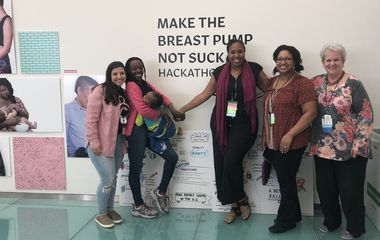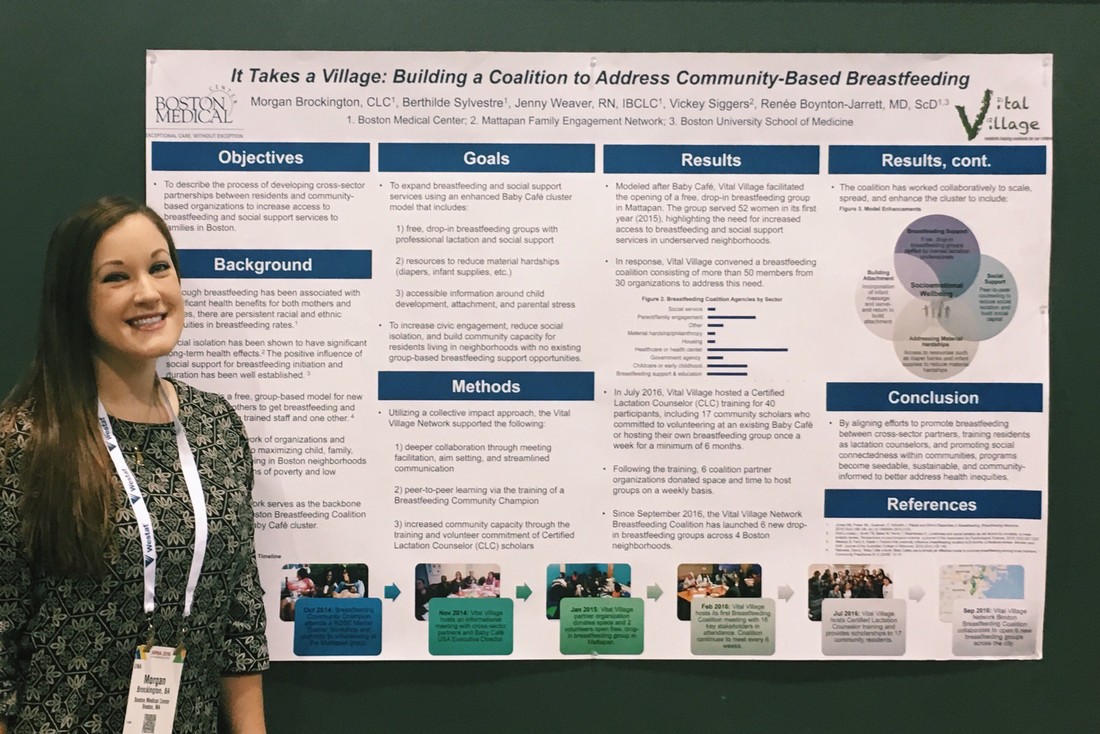Breastfeeding Coalition Targets Racial Disparities, Workforce Development
With drop-in support groups and a service-learning program, the Vital Village Network seeks to support breastfeeding and create economic opportunity.
From Health City
By: Karen Morales, 7/31/2019
By: Karen Morales, 7/31/2019

Even though Dominique Bellegarde was not breastfed as an infant herself, she has successfully nursed four out of her five children. She was able to do so, she says, because she had the support of her mother-in-law, who raised her children in a large, supportive community of women in Haiti.
“Her history of what she went through with nursing really helped guide me and keep me going,” says Bellegarde.
In contrast, Bellegarde’s birth mother immigrated from Haiti to the U.S. at 21 years old. When she had children soon after, she tried to nurse, but she had difficulty with it and opted for formula instead. In Haiti, she had been taken out of school to help her family financially, Bellegarde notes, and in Boston, she knew only a few people and wasn't surrounded by other nursing mothers..
Read the fully story here.
“Her history of what she went through with nursing really helped guide me and keep me going,” says Bellegarde.
In contrast, Bellegarde’s birth mother immigrated from Haiti to the U.S. at 21 years old. When she had children soon after, she tried to nurse, but she had difficulty with it and opted for formula instead. In Haiti, she had been taken out of school to help her family financially, Bellegarde notes, and in Boston, she knew only a few people and wasn't surrounded by other nursing mothers..
Read the fully story here.
The Winners of the 2018 Make the Breast Pump Not Suck Hackathon
By: Becky Michaelson

Everyone won at the #MITBreastFest on April 27–29th, 2018, when 300+ people gathered to catalyze innovation in products, research, storytelling, and policy-making, all with a focus on equity. Participants were galvanized by keynote talks on systemic change, equity x design workshops, and boob-shaped cupcakes that served during the launch of the book, 27 Stories of What It’s Really Like to Breastfeed and Pump in the United States. There was dedicated time for empathy with those effected most by breastfeeding inequities alongside playful and vibrant artwork and installations. Everyone won through absorbing formal and informal learning experiences, meeting like-minded passionate people, and collaborating across diverse skillsets while hacking.
To celebrate the diversity of ideas (rather than incentivizing hierarchical competition), we offered twelve relationship- and experience-based prizes. Read more about this strategic process, led by Willow Brugh in her post, “Judging Towards Equity, Not Individualism”. All of the prize descriptions along with the judging information can be found here.
Who Won?
The Connections Award (Ameda)
The Vital Village Community Transformers project, led by local community leaders in Boston, is clearing the path for more lactation professionals of color by the use of public health art. They aim to take the first picture of 100 women or more of color breastfeeding on August 11, 2018. This effort will launch their Black Breastfeeding Week Boston initiative.
(For full list of winners, read the full article here).
Who were the judges?
The judging process was facilitated by Willow Brugh. Read more about the judging strategy toward equity here.
Stay tuned with the #breastfeedinginnovation movement by following the additional hashtags #MITBreastFest and #makepolicyleavenotsuck. In the coming months, we’ll be reflecting on the equity-driven and cross-disciplinary efforts toward building a better future of breastfeeding.
Link to full article here.
To celebrate the diversity of ideas (rather than incentivizing hierarchical competition), we offered twelve relationship- and experience-based prizes. Read more about this strategic process, led by Willow Brugh in her post, “Judging Towards Equity, Not Individualism”. All of the prize descriptions along with the judging information can be found here.
Who Won?
The Connections Award (Ameda)
The Vital Village Community Transformers project, led by local community leaders in Boston, is clearing the path for more lactation professionals of color by the use of public health art. They aim to take the first picture of 100 women or more of color breastfeeding on August 11, 2018. This effort will launch their Black Breastfeeding Week Boston initiative.
(For full list of winners, read the full article here).
Who were the judges?
The judging process was facilitated by Willow Brugh. Read more about the judging strategy toward equity here.
- Flojaune Griffin Cofer, Director of State Policy and Research, Public Health Advocates
- Leah De Shay, IBCLC, The Leaky Boob
- Melissa Hanna, CEO, Mahmee
- Yvonne Lin, Designer, 4B Collective
- Jenn Roberts, Equity Lead, Make the Breast Pump Not Suck
- Nina Simbaña, Expert-in-Residence
Stay tuned with the #breastfeedinginnovation movement by following the additional hashtags #MITBreastFest and #makepolicyleavenotsuck. In the coming months, we’ll be reflecting on the equity-driven and cross-disciplinary efforts toward building a better future of breastfeeding.
Link to full article here.

Boston Basics News
DoBasicsPlanting the Seeds for Early Learning
The Pediatric Department at Boston Medical Center is thrilled to partner with Boston Basics. The creative approach Boston Basics has developed…will allow us to focus health care on the whole child.
--Bob Vinci, M.D., Chief of Pediatrics, BMC
Every day, Rachel Hoch helps usher new babies into the world as a nurse practitioner in Boston Medical Center's MotherBaby Unit. She monitors and supports newborns and their families throughout their hospital stay.
Before moms and babies are discharged from the hospital, Rachel instructs families on a number of topics and helps them know what to expect. Since last summer, she has been sharing the Boston Basics in these conversations, and says her role is to “plant the seed” for the Boston Basics.
“I always talk about brain growth and that 80% of brain growth happens in the first three years—which is the perfect intro to the Basics,” says Rachel. She tries to show each family at least one of the videos, often in Spanish or Haitian Creole.
Nurse Hoch encourages moms and visitors to share the videos and website with their family and friends, finding that “the videos always bring smiles to everyone’s faces.” After watching, parents usually raise issues or questions about what they’ve seen. When older siblings are present, Rachel loves to talk to them about their “important job” of reading to the new baby. BMC is also distributing Boston Basics materials to nursing mothers through its weekly
Baby Café.
Hospital leaders are looking into additional ways of spreading the Basics. Bob Vinci, Chief of Pediatrics, says, “The Pediatric Department at Boston Medical Center is thrilled to partner with Boston Basics. The creative approach Boston Basics has developed will improve child health by emphasizing a nurturing and stimulating environment. Our health care system will integrate their core principles into our clinical model and in doing so, will allow us to focus health care on the whole child.”
Tips
BostonBasics.Org
DoBasicsPlanting the Seeds for Early Learning
The Pediatric Department at Boston Medical Center is thrilled to partner with Boston Basics. The creative approach Boston Basics has developed…will allow us to focus health care on the whole child.
--Bob Vinci, M.D., Chief of Pediatrics, BMC
Every day, Rachel Hoch helps usher new babies into the world as a nurse practitioner in Boston Medical Center's MotherBaby Unit. She monitors and supports newborns and their families throughout their hospital stay.
Before moms and babies are discharged from the hospital, Rachel instructs families on a number of topics and helps them know what to expect. Since last summer, she has been sharing the Boston Basics in these conversations, and says her role is to “plant the seed” for the Boston Basics.
“I always talk about brain growth and that 80% of brain growth happens in the first three years—which is the perfect intro to the Basics,” says Rachel. She tries to show each family at least one of the videos, often in Spanish or Haitian Creole.
Nurse Hoch encourages moms and visitors to share the videos and website with their family and friends, finding that “the videos always bring smiles to everyone’s faces.” After watching, parents usually raise issues or questions about what they’ve seen. When older siblings are present, Rachel loves to talk to them about their “important job” of reading to the new baby. BMC is also distributing Boston Basics materials to nursing mothers through its weekly
Baby Café.
Hospital leaders are looking into additional ways of spreading the Basics. Bob Vinci, Chief of Pediatrics, says, “The Pediatric Department at Boston Medical Center is thrilled to partner with Boston Basics. The creative approach Boston Basics has developed will improve child health by emphasizing a nurturing and stimulating environment. Our health care system will integrate their core principles into our clinical model and in doing so, will allow us to focus health care on the whole child.”
Tips
- Week of the Young Child (Apr 24-28): Participate during this week by liking the Boston Basics on Facebook and sharing our posts with the parents and caregivers in your life.
- Easily share the Boston Basics videos with your patients or clients by streaming them on an iPad or smartphone.
- Older children can make a big difference in the lives of their little siblings and cousins by doing the Basics – they can read a book or play with them!
BostonBasics.Org
Morgan Brockington, CLC presented a poster on the Vital Village Network Boston Breastfeeding Coalition at the American Public Health Association Annual Meeting in Denver, Colorado on October 31st.

